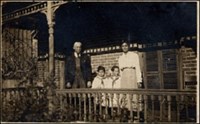Explore educational material about civil rights on our For Teachers page. The page is a searchable database with lesson plans, classroom materials, field experiences, distance learning, and other educational materials related to Civil Rights in our national parks. The educational material is broken in to areas such as material type, location, topic, and grade range.
Visit our Pivotal Moments in Civil Rights History page on this site for essays grouped by time period covering almost 400 years of civil rights history in the United States. Each time period also has links to web pages with people and places stories related to the relevant period in history.
Learn about the Teaching with Historic Places lesson plans and how historic places enliven history, social studies, geography, civics, and other subjects.
Use the National Park Service's Multimedia Search to look for podcasts, audio, video, and photos pertaining to civil rights history
Look below to find our online articles that tell the stories of events, people, and locations involved with civil rights. The stories cover many aspects of civil rights in the United States and are a good source of information for educators, students, and anyone else interested in civil rights and history.
Civil Rights Lesson Plans & More
- Type: Lesson Plan
- Locations: Belmont-Paul Women's Equality National Monument, National Mall and Memorial Parks, Pennsylvania Avenue
- Grade Levels: Middle School: Sixth Grade through Eighth Grade
- Subject(s): Social Studies

Students will identify locations on a street map using accompanying text. They will search a database to find historical photos of the corresponding locations. Using what they have discovered, they will analyze the connection between location and methods of working for change. Taking it further, the students will identify an issue they would like to advocate for and describe a corresponding location to work for that change.
- Type: Lesson Plan
- Grade Levels: Middle School: Sixth Grade through Eighth Grade
- Subject(s): Literacy and Language Arts,Social Studies
- Type: Lesson Plan
- Grade Levels: Middle School: Sixth Grade through Eighth Grade
- Subject(s): Social Studies
Learn about the 1954 U.S. Supreme Court case that struck down "separate but equal".
- Cane River Creole National Historical Park
Civil Rights Leaders Bingo
- Type: Lesson Plan
- Locations: Cane River Creole National Historical Park
- Grade Levels: Upper Elementary: Third Grade through Fifth Grade
- Subject(s): Social Studies
- Carl Sandburg Home National Historic Site
Civil Rights Then and Now (Grades 9-12) Carl Sandburg Home NHS
- Booker T Washington National Monument
Clash of the Titans
- Type: Lesson Plan
- Locations: Booker T Washington National Monument
- Grade Levels: Middle School: Sixth Grade through Eighth Grade
- Subject(s): Social Studies
Students will examine philosophies of Booker T. Washington and W.E.B. DuBois and gain insight into what motivated these men to act, in what they felt was the best interest of African Americans of the period. Activities included will enable students to investigate, research, & participate in meaningful learning experiences. They will build a strong foundation in communication skills, research techniques, computer skills, writing, and thinking in terms of multiple points of view.
- Charles Young Buffalo Soldiers National Monument
Discover Colonel Young's Protest Ride for Equality and Country: A Lightning Lesson from Teaching with Historic Places, featuring the historic Colonel Charles Young House
- Type: Lesson Plan
- Locations: Charles Young Buffalo Soldiers National Monument
- Grade Levels: Middle School: Sixth Grade through Eighth Grade
- Subject(s): Literacy and Language Arts,Social Studies
During WWI, African American Colonel Charles Young rode horseback for two weeks to protest discrimination in the U.S. Army.
- Type: Lesson Plan
- Grade Levels: Middle School: Sixth Grade through Eighth Grade
- Subject(s): Literacy and Language Arts,Social Studies
- Type: Lesson Plan
- Grade Levels: Middle School: Sixth Grade through Eighth Grade
- Subject(s): Literacy and Language Arts,Social Studies
Before the end of legal slavery in the United States, free African Americans migrated to Canada to find greater security and liberty. After the Civil War, some returned to the U.S. to aid emancipated people and rebuild the South. Mary Ann Shadd Cary was a business woman, abolitionist, and suffragist.
Last updated: June 23, 2023





